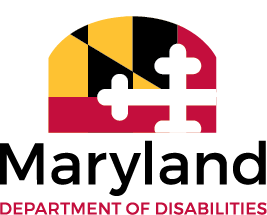Transitioning from high school to postsecondary education after graduation can be exciting and challenging. Most students and their families have many questions.
Let’s explore some answers to common questions about disability supports in college.
Quick Tips
For more information, please contact the college or university you are interested in attending.
You should begin planning your postsecondary education a year or two before you graduate.

How Can I Prepare for Postsecondary Education?
Postsecondary education includes attending
- two or four-year colleges or universities,
- trade and vocational schools,
- or other adult education programs.
Here are some good resources that can help you prepare for postsecondary education.
Maryland Higher Education Commission
The Maryland Higher Education Commission’s website provides guides about how elementary, middle, and high school students can prepare for postsecondary education as well as information about college searches and financial planning.Making My Way through College
In Making My Way through College you will find information on a variety of topics relevant to preparing for and succeeding in college and transitioning from college into the world of work.Postsecondary Education for Students with Intellectual Disabilities
Think College publishes personal stories from students, families, and postsecondary education professionals related to postsecondary education for students with intellectual disabilities.Financial Aid and Public Benefits
Fact Sheet with frequently asked questions about options for paying for college.Supports and Accommodations in Postsecondary Education
Will I still receive IEP or 504 supports and services in college?
No. When you are in high school, you receive supports under a law called the Individuals with Disabilities Education Act (IDEA) which provides a free, appropriate public education for students with disabilities. It is the school’s responsibility to identify students and provide services.
IDEA does not apply to colleges and universities. Colleges and universities provide disability support services in compliance with Title II of the Americans with Disabilities Act (ADA) and Section 504 of the Vocational Rehabilitation Act.
To get reasonable accommodations or other disability services in a postsecondary setting, you will need to disclose your disability. It is your responsibility to request services and provide appropriate documentation of your disability. This is where your self-advocacy skills can be put to good use!
Will I get the same accommodations as high school?
When should I request services?
Although you may request accommodations from your college/university at any time, it is recommended that you make an appointment with the Disability Support Services office as soon as possible and no later than one month before the semester begins.
Colleges/universities are committed to working with and providing you with reasonable services and accommodations. However, arranging services and accommodations takes time. Some academic adjustments may take more time to provide than others. More about requesting services at college .
Other Considerations
Do I have to follow the same requirements as other students?
What will I need to do to earn a college degree?
Featured Resources
Requesting Services at College
Find out six basic steps to take for requesting accommodations or other disability services at college.
Receiving Accommodations at College
What kind of accommodations can be requested and what is not provided? Here are a few examples.
Building Your Self-Advocacy Skills
Self-advocacy means speaking up for yourself and asking for your needs and wants. Learn how to make decisions and become more independent by learning self-advocacy skills.Related Resources

Receiving Accommodations at College

Requesting Services at College

Assistive Technology

Internships, Apprenticeships and Mentors

Maryland Youth Leadership Forum

Student Service-Learning

Transition Programs

Applying for Jobs

National Collaborative on Workforce and Disability (NCWD)

Think College

PACER

Maryland Department of Disabilities (MDOD)

Division of Rehabilitation Services (DORS)

